12 books about Narayan, R. K.
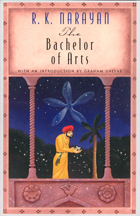
The Bachelor of Arts
R. K. Narayan
University of Chicago Press, 1978
"There are writers—Tolstoy and Henry James to name two—whom we hold in awe, writers—Turgenev and Chekhov—for whom we feel a personal affection, other writers whom we respect—Conrad for example—but who hold us at a long arm's length with their 'courtly foreign grace.' Narayan (whom I don't hesitate to name in such a context) more than any of them wakes in me a spring of gratitude, for he has offered me a second home. Without him I could never have known what it is like to be Indian."—Graham Greene
Offering rare insight into the complexities of Indian middle-class society, R. K. Narayan traces life in the fictional town of Malgudi. The Dark Room is a searching look at a difficult marriage and a woman who eventually rebels against the demands of being a good and obedient wife. In Mr. Sampath, a newspaper man tries to keep his paper afloat in the face of social and economic changes sweeping India. Narayan writes of youth and young adulthood in the semiautobiographical Swami and Friends and The Bachelor of Arts. Although the ordinary tensions of maturing are heightened by the particular circumstances of pre-partition India, Narayan provides a universal vision of childhood, early love and grief.
"The experience of reading one of his novels is . . . comparable to one's first reaction to the great Russian novels: the fresh realization of the common humanity of all peoples, underlain by a simultaneous sense of strangeness—like one's own reflection seen in a green twilight."—Margaret Parton, New York Herald Tribune
Offering rare insight into the complexities of Indian middle-class society, R. K. Narayan traces life in the fictional town of Malgudi. The Dark Room is a searching look at a difficult marriage and a woman who eventually rebels against the demands of being a good and obedient wife. In Mr. Sampath, a newspaper man tries to keep his paper afloat in the face of social and economic changes sweeping India. Narayan writes of youth and young adulthood in the semiautobiographical Swami and Friends and The Bachelor of Arts. Although the ordinary tensions of maturing are heightened by the particular circumstances of pre-partition India, Narayan provides a universal vision of childhood, early love and grief.
"The experience of reading one of his novels is . . . comparable to one's first reaction to the great Russian novels: the fresh realization of the common humanity of all peoples, underlain by a simultaneous sense of strangeness—like one's own reflection seen in a green twilight."—Margaret Parton, New York Herald Tribune
[more]
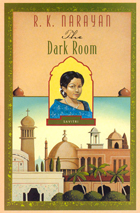
The Dark Room
R. K. Narayan
University of Chicago Press, 1981
"There are writers—Tolstoy and Henry James to name two—whom we hold in awe, writers—Turgenev and Chekhov—for whom we feel a personal affection, other writers whom we respect—Conrad for example—but who hold us at a long arm's length with their 'courtly foreign grace.' Narayan (whom I don't hesitate to name in such a context) more than any of them wakes in me a spring of gratitude, for he has offered me a second home. Without him I could never have known what it is like to be Indian."—Graham Greene
Offering rare insight into the complexities of Indian middle-class society, R. K. Narayan traces life in the fictional town of Malgudi. The Dark Room is a searching look at a difficult marriage and a woman who eventually rebels against the demands of being a good and obedient wife. In Mr. Sampath, a newspaper man tries to keep his paper afloat in the face of social and economic changes sweeping India. Narayan writes of youth and young adulthood in the semiautobiographical Swami and Friends and The Bachelor of Arts. Although the ordinary tensions of maturing are heightened by the particular circumstances of pre-partition India, Narayan provides a universal vision of childhood, early love and grief.
"The experience of reading one of his novels is . . . comparable to one's first reaction to the great Russian novels: the fresh realization of the common humanity of all peoples, underlain by a simultaneous sense of strangeness—like one's own reflection seen in a green twilight."—Margaret Parton, New York Herald Tribune
Offering rare insight into the complexities of Indian middle-class society, R. K. Narayan traces life in the fictional town of Malgudi. The Dark Room is a searching look at a difficult marriage and a woman who eventually rebels against the demands of being a good and obedient wife. In Mr. Sampath, a newspaper man tries to keep his paper afloat in the face of social and economic changes sweeping India. Narayan writes of youth and young adulthood in the semiautobiographical Swami and Friends and The Bachelor of Arts. Although the ordinary tensions of maturing are heightened by the particular circumstances of pre-partition India, Narayan provides a universal vision of childhood, early love and grief.
"The experience of reading one of his novels is . . . comparable to one's first reaction to the great Russian novels: the fresh realization of the common humanity of all peoples, underlain by a simultaneous sense of strangeness—like one's own reflection seen in a green twilight."—Margaret Parton, New York Herald Tribune
[more]
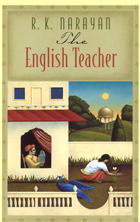
The English Teacher
R. K. Narayan
University of Chicago Press, 1980
This novel completes the informal trilogy which began with Swami and Friends and The Bachelor of Arts. The protagonist, Krishna, is an English teacher at the same college he had attended as a student. Although Krishna has recently married, his wife Susila and their daughter live with his parents-in-law some miles away. The story opens with his immediate family deciding to join him in Malgudi. Krishna is initially frightened by his new state of affairs, but he soon finds that his love for both his wife and child grows deeper than he could have imagined.
"Mr. Narayan has repeatedly been compared with Chekhov. Ordinarily such comparisons are gratuitous and strained, but in this case there are such clear and insistent echoes that any careful reader will be aware of them. There is that sense of rightness which transcends mere structure. There is the inexplicable blending of tragedy and humor. Most of all, there is a brooding awareness of fate which makes the story seem not authored, but merely translated."—J.F. Muehl, Saturday Review
"[Narayan] does not deal in exemplary fates, and the Western novel's machinery of retribution is far too grandiose for him. . . . In Narayan's world, scores are not settled but dissolved, recycled, restated. 'Both of us will shed our forms soon and perhaps we could meet again, who knows? So goodbye for the present.' These are the concluding words for the novel A Tiger for Malgudi, but they constitute a universal epilogue one could append to most of Narayan's fiction."—Russell Davies, Times Literary Supplement
"Mr. Narayan has repeatedly been compared with Chekhov. Ordinarily such comparisons are gratuitous and strained, but in this case there are such clear and insistent echoes that any careful reader will be aware of them. There is that sense of rightness which transcends mere structure. There is the inexplicable blending of tragedy and humor. Most of all, there is a brooding awareness of fate which makes the story seem not authored, but merely translated."—J.F. Muehl, Saturday Review
"[Narayan] does not deal in exemplary fates, and the Western novel's machinery of retribution is far too grandiose for him. . . . In Narayan's world, scores are not settled but dissolved, recycled, restated. 'Both of us will shed our forms soon and perhaps we could meet again, who knows? So goodbye for the present.' These are the concluding words for the novel A Tiger for Malgudi, but they constitute a universal epilogue one could append to most of Narayan's fiction."—Russell Davies, Times Literary Supplement
[more]
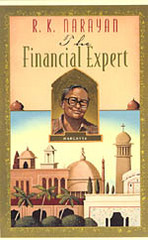
The Financial Expert
R. K. Narayan
University of Chicago Press, 1981
In The Financial Expert, R. K. Narayan once again transports readers to the southern Indian town of Malgudi. This story centers around the life and pursuits of Margayya, a man of many hopes but few resources, who spends his time under the banyan tree offering expert financial advice to those willing to pay for his knowledge. Margayya's rags-to-riches story brings forth the rich imagery of Indian life with the absorbing details and vivid storytelling that are Narayan's trademarks.
"The novels of R. K. Narayan are the best I have read in any language for a long time."—Amit Roy, Daily Telegraph
"The experience of reading one of his novels is . . . comparable to one's first reaction to the great Russian novels: the fresh realization of the common humanity of all peoples."—Margaret Parton, New York Herald Tribune Book Review
"The hardest of all things for a novelist to communicate is the extraordinary ordinariness of most human happiness. . . . Jane Austen, Soseki, Chekhov: a few bring it off. Narayan is one of them."—Francis King, Spectator
"The novels of R. K. Narayan are the best I have read in any language for a long time."—Amit Roy, Daily Telegraph
"The experience of reading one of his novels is . . . comparable to one's first reaction to the great Russian novels: the fresh realization of the common humanity of all peoples."—Margaret Parton, New York Herald Tribune Book Review
"The hardest of all things for a novelist to communicate is the extraordinary ordinariness of most human happiness. . . . Jane Austen, Soseki, Chekhov: a few bring it off. Narayan is one of them."—Francis King, Spectator
[more]
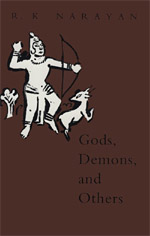
Gods, Demons, and Others
R. K. Narayan llustrated by R. K. Laxman
University of Chicago Press, 1993
Following in the footsteps of the storytellers of his native India, R. K. Narayan has produced his own versions of tales taken from the Ramayana and the Mahabarata. Carefully selecting those stories which include the strongest characters, and omitting the theological or social commentary that would have drawn out the telling, Narayan informs these fascinating myths with his urbane humor and graceful style.
"Mr. Narayan gives vitality and an original viewpoint to the most ancient of legends, lacing them with his own blend of satire, pertinent explanation and thoughtful commentary."—Santha Rama Rau, New York Times
"Narayan's narrative style is swift, firm, graceful, and lucid . . . thoroughly knowledgeable, skillful, entertaining. One could hardly hope for more."—Rosanne Klass, Times Literary Supplement
"Mr. Narayan gives vitality and an original viewpoint to the most ancient of legends, lacing them with his own blend of satire, pertinent explanation and thoughtful commentary."—Santha Rama Rau, New York Times
"Narayan's narrative style is swift, firm, graceful, and lucid . . . thoroughly knowledgeable, skillful, entertaining. One could hardly hope for more."—Rosanne Klass, Times Literary Supplement
[more]
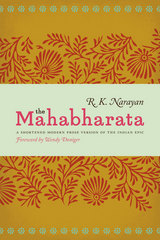
The Mahabharata
A Shortened Modern Prose Version of the Indian Epic
R. K. Narayan
University of Chicago Press, 2013
The Mahabharata tells a story of such violence and tragedy that many people in India refuse to keep the full text in their homes, fearing that if they do, they will invite a disastrous fate upon their house. Covering everything from creation to destruction, this ancient poem remains an indelible part of Hindu culture and a landmark in ancient literature.
Centuries of listeners and readers have been drawn to The Mahabharata, which began as disparate oral ballads and grew into a sprawling epic. The modern version is famously long, and at more than 1.8 million words—seven times the combined lengths of the Iliad and Odyssey—it can be incredibly daunting.
Contemporary readers have a much more accessible entry point to this important work, thanks to R. K. Narayan’s masterful translation and abridgement of the poem. Now with a new foreword by Wendy Doniger, as well as a concise character and place guide and a family tree, The Mahabharata is ready for a new generation of readers. As Wendy Doniger explains in the foreword, “Narayan tells the stories so well because they’re all his stories.” He grew up hearing them, internalizing their mythology, which gave him an innate ability to choose the right passages and their best translations.
In this elegant translation, Narayan ably distills a tale that is both traditional and constantly changing. He draws from both scholarly analysis and creative interpretation and vividly fuses the spiritual with the secular. Through this balance he has produced a translation that is not only clear, but graceful, one that stands as its own story as much as an adaptation of a larger work.
Centuries of listeners and readers have been drawn to The Mahabharata, which began as disparate oral ballads and grew into a sprawling epic. The modern version is famously long, and at more than 1.8 million words—seven times the combined lengths of the Iliad and Odyssey—it can be incredibly daunting.
Contemporary readers have a much more accessible entry point to this important work, thanks to R. K. Narayan’s masterful translation and abridgement of the poem. Now with a new foreword by Wendy Doniger, as well as a concise character and place guide and a family tree, The Mahabharata is ready for a new generation of readers. As Wendy Doniger explains in the foreword, “Narayan tells the stories so well because they’re all his stories.” He grew up hearing them, internalizing their mythology, which gave him an innate ability to choose the right passages and their best translations.
In this elegant translation, Narayan ably distills a tale that is both traditional and constantly changing. He draws from both scholarly analysis and creative interpretation and vividly fuses the spiritual with the secular. Through this balance he has produced a translation that is not only clear, but graceful, one that stands as its own story as much as an adaptation of a larger work.
[more]
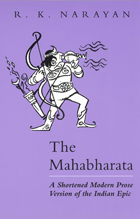
The Mahabharata
A Shortened Modern Prose Version of the Indian Epic
R. K. Narayan
University of Chicago Press, 2000
Growing from an oral tradition of ballads based on historic events in India, the Mahabharata was passed down and extended through the centuries, becoming the longest poem ever written. R. K. Narayan provides a superb rendition in an abbreviated and elegant retelling of this great epic.
[more]
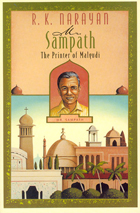
Mr. Sampath--the Printer of Malgudi
R. K. Narayan
University of Chicago Press, 1949
"There are writers—Tolstoy and Henry James to name two—whom we hold in awe, writers—Turgenev and Chekhov—for whom we feel a personal affection, other writers whom we respect—Conrad for example—but who hold us at a long arm's length with their 'courtly foreign grace.' Narayan (whom I don't hesitate to name in such a context) more than any of them wakes in me a spring of gratitude, for he has offered me a second home. Without him I could never have known what it is like to be Indian."—Graham Greene
Offering rare insight into the complexities of Indian middle-class society, R. K. Narayan traces life in the fictional town of Malgudi. The Dark Room is a searching look at a difficult marriage and a woman who eventually rebels against the demands of being a good and obedient wife. In Mr. Sampath, a newspaper man tries to keep his paper afloat in the face of social and economic changes sweeping India. Narayan writes of youth and young adulthood in the semiautobiographical Swami and Friends and The Bachelor of Arts. Although the ordinary tensions of maturing are heightened by the particular circumstances of pre-partition India, Narayan provides a universal vision of childhood, early love and grief.
"The experience of reading one of his novels is . . . comparable to one's first reaction to the great Russian novels: the fresh realization of the common humanity of all peoples, underlain by a simultaneous sense of strangeness—like one's own reflection seen in a green twilight."—Margaret Parton, New York Herald Tribune
"Narayan's limits are meticulously imposed and observed but his humor and compassion come from a deep universal well, with the result that he has transformed his imaginary township of Malgudi into a bubbling parish of the world."—Christopher Wordsworth, Observer
Offering rare insight into the complexities of Indian middle-class society, R. K. Narayan traces life in the fictional town of Malgudi. The Dark Room is a searching look at a difficult marriage and a woman who eventually rebels against the demands of being a good and obedient wife. In Mr. Sampath, a newspaper man tries to keep his paper afloat in the face of social and economic changes sweeping India. Narayan writes of youth and young adulthood in the semiautobiographical Swami and Friends and The Bachelor of Arts. Although the ordinary tensions of maturing are heightened by the particular circumstances of pre-partition India, Narayan provides a universal vision of childhood, early love and grief.
"The experience of reading one of his novels is . . . comparable to one's first reaction to the great Russian novels: the fresh realization of the common humanity of all peoples, underlain by a simultaneous sense of strangeness—like one's own reflection seen in a green twilight."—Margaret Parton, New York Herald Tribune
"Narayan's limits are meticulously imposed and observed but his humor and compassion come from a deep universal well, with the result that he has transformed his imaginary township of Malgudi into a bubbling parish of the world."—Christopher Wordsworth, Observer
[more]

R. K. Narayan
A Critical Appreciation
William Walsh
University of Chicago Press, 1982
R. K. Narayan, author of more than a dozen novels and numerous short stories, is a writer of international stature. Only recently, however, has he received the critical attention that is his due.
This lucid and often eloquent study provides both new and devoted Narayan readers with an introduction to his life and work. William Walsh, who makes generous and apt use of quotations from Narayan's work, traces Narayan's artistic development and brings into clear relief the qualities that characterize his fiction: gentle irony, humor, and a tolerance of human foibles. Both a criticism and an appreciation, this work will prove valuable to those already acquainted with this delightful and important novelist and will lead others to his work for the first time.
This lucid and often eloquent study provides both new and devoted Narayan readers with an introduction to his life and work. William Walsh, who makes generous and apt use of quotations from Narayan's work, traces Narayan's artistic development and brings into clear relief the qualities that characterize his fiction: gentle irony, humor, and a tolerance of human foibles. Both a criticism and an appreciation, this work will prove valuable to those already acquainted with this delightful and important novelist and will lead others to his work for the first time.
[more]
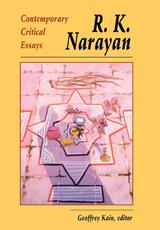
R. K. Narayan
Contemporary Critical Essays
Geoffrey Kain
Michigan State University Press, 1993
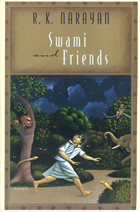
Swami and Friends
R. K. Narayan
University of Chicago Press, 1980
"There are writers—Tolstoy and Henry James to name two—whom we hold in awe, writers—Turgenev and Chekhov—for whom we feel a personal affection, other writers whom we respect—Conrad for example—but who hold us at a long arm's length with their 'courtly foreign grace.' Narayan (whom I don't hesitate to name in such a context) more than any of them wakes in me a spring of gratitude, for he has offered me a second home. Without him I could never have known what it is like to be Indian."—Graham Greene
Offering rare insight into the complexities of Indian middle-class society, R. K. Narayan traces life in the fictional town of Malgudi. The Dark Room is a searching look at a difficult marriage and a woman who eventually rebels against the demands of being a good and obedient wife. In Mr. Sampath, a newspaper man tries to keep his paper afloat in the face of social and economic changes sweeping India. Narayan writes of youth and young adulthood in the semiautobiographical Swami and Friends and The Bachelor of Arts. Although the ordinary tensions of maturing are heightened by the particular circumstances of pre-partition India, Narayan provides a universal vision of childhood, early love and grief.
"The experience of reading one of his novels is . . . comparable to one's first reaction to the great Russian novels: the fresh realization of the common humanity of all peoples, underlain by a simultaneous sense of strangeness—like one's own reflection seen in a green twilight."—Margaret Parton, New York Herald Tribune
"The novels of R.K. Narayan are the best I have read in any language for a long time. . . . His work gives the conviction that it is possible to capture in English, a language not born of India, the distinctive characteristics of Indian family life."—Amit Roy, Daily Telegraph
Offering rare insight into the complexities of Indian middle-class society, R. K. Narayan traces life in the fictional town of Malgudi. The Dark Room is a searching look at a difficult marriage and a woman who eventually rebels against the demands of being a good and obedient wife. In Mr. Sampath, a newspaper man tries to keep his paper afloat in the face of social and economic changes sweeping India. Narayan writes of youth and young adulthood in the semiautobiographical Swami and Friends and The Bachelor of Arts. Although the ordinary tensions of maturing are heightened by the particular circumstances of pre-partition India, Narayan provides a universal vision of childhood, early love and grief.
"The experience of reading one of his novels is . . . comparable to one's first reaction to the great Russian novels: the fresh realization of the common humanity of all peoples, underlain by a simultaneous sense of strangeness—like one's own reflection seen in a green twilight."—Margaret Parton, New York Herald Tribune
"The novels of R.K. Narayan are the best I have read in any language for a long time. . . . His work gives the conviction that it is possible to capture in English, a language not born of India, the distinctive characteristics of Indian family life."—Amit Roy, Daily Telegraph
[more]
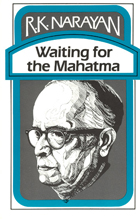
Waiting for Mahatma
R. K. Narayan
University of Chicago Press, 1955
"R.K. Narayan . . . has been compared to Gogol in England, where he has acquired a well-deserved reputation. The comparison is apt, for Narayan, an Indian, is a writer of Gogol's stature, with the same gift for creating a provincial atmosphere in a time of change. . . . One is convincingly involved in this alien world without ever being aware of the technical devices Narayan so brilliantly employs."—Anthony West, The New Yorker
"The experience of reading one of his novels is . . . comparable to one's first reaction to the great Russian novels: the fresh realization of the common humanity of all peoples, underlain by a simultaneous sense of strangeness—like one's own reflection seen in a green twilight."—Margaret Parton, New Herald Tribune Book Review
"The hardest of all things for a novelist to communicate is the extraordinary ordinariness of most human happiness. . . . Jane Austen, Soseki, Chekhov: a few bring it off. Narayan is one of them."—Francis King, Spectator
"The novels of R.K. Narayan are the best I have read in any language for a long time."—Amit Roy, Daily Telegraph
"The experience of reading one of his novels is . . . comparable to one's first reaction to the great Russian novels: the fresh realization of the common humanity of all peoples, underlain by a simultaneous sense of strangeness—like one's own reflection seen in a green twilight."—Margaret Parton, New Herald Tribune Book Review
"The hardest of all things for a novelist to communicate is the extraordinary ordinariness of most human happiness. . . . Jane Austen, Soseki, Chekhov: a few bring it off. Narayan is one of them."—Francis King, Spectator
"The novels of R.K. Narayan are the best I have read in any language for a long time."—Amit Roy, Daily Telegraph
[more]
READERS
Browse our collection.
PUBLISHERS
See BiblioVault's publisher services.
STUDENT SERVICES
Files for college accessibility offices.
UChicago Accessibility Resources
home | accessibility | search | about | contact us
BiblioVault ® 2001 - 2024
The University of Chicago Press









